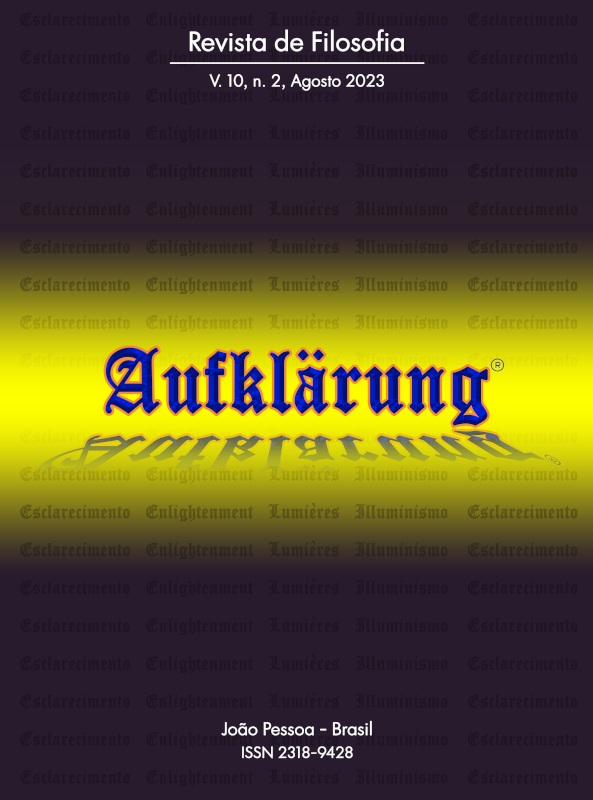Contradictory effects of advanced technology: notes on accelerated technological objectivity
DOI:
https://doi.org/10.18012/arf.v10i2.63471Keywords:
Digital technologies, artificial intelligence, critical theory, capitalism.Abstract
This article aims to highlight about representative character of new digital technologies and from their contradictory accelerated effects to society and their constitutive relationships. To this end, reflects concerning state considerations of private and real things in which new technologies deal. Moreover, search highlight the proximity of this advance in knowledge with to the enlightened myths. Finally, signals the actuality of critical to nonconformity and resistance to modern regressions, because the possible fusion of biological and digital results in more control being the sophistry of nature’s liberation in slavery irrational of technoscientific reason.
Downloads
References
ADORNO, Theodor; HORKHEIMER, Max. Dialética do Esclarecimento:fragmentos filosóficos. Tradução: Guido Antônio de Almeida. Rio de Janeiro: JorgeZahar Editora, 1985.
ADORNO, Theodor. Dialética Negativa. Tradução: Marco Antonio Casanova. Rio de Janeiro: Jorge Zahar Ed, 2009.
ADORNO, Theodor. Educação e Emancipação.Tradução: Wolfgang Leo Maar. Rio de Janeiro: Paz e Terra, 1995.
ADORNO, Theodor. Ensaios sobre psicologia social e psicanálise. Tradução: Verlaine Freitas. São Paulo: Editora Unesp, 2015.
BENJAMIN, Walter. Pequena história da fotografia. In: Obras escolhidas:magia e técnica, arte e política. Tradução: Sergio Paulo Rouanet e Jeanne Marie Gagnebin. São Paulo: Brasiliense, 2013.
CAMPBELL, Heidi A. Problematizing the Human-Technology Relationship through Techno-Spiritual Myths Presented in The Machine, Transcendence and Her. Journal of Religion & Film, 2016. Disponível em: https://core.ac.uk/download/pdf/232771466.pdf
DOROBANTU, Marius. Are humans hackable? Artificial intelligence, demonic intelligence, and the notion of our free will. (Society for Philosophy of Technology) – “Technological Imaginaries”. Presentation at the SPT Conference, 2021. Disponível em: https://youtu.be/e49iUHVRD3I. Acesso em 15/08/2021.
ENZENSBERGER, Hans Magnus. Elementos para uma Teoria dos Meios de Comunicação. Editora: Tempo brasileiro, 1978.
FOUCAULT, Michel. (1978-1979). Nascimento da biopolítica: curso dado no College de France. Tradução de Eduardo Brandão. São Paulo: Martins Fontes, 2008.
FREUD, Sigmund. (1906=1909). O delírio e os sonhos na Gradiva: Análise da fobia de um garoto de cinco anos e outros textos. Tradução: Paulo César de Souza. São Paulo: Companhia das Letras, 2015.
FREUD, Sigmund. (1930). O mal-estar na civilização, novas conferências introdutórias à psicanálise e outros textos [1930-1936]. Tradução de Paulo César de Souza. São Paulo: Companhia das Letras, 2010.
GREEN, B.P. Ethical Reflections on Artificial Intelligence. Scientia et Fides, 2018. Disponível em: http://dadun.unav.edu/bitstream/10171/58244/1/01.pdf
HANSON, D. Hanson Robotics. Disponível em: https://www.hansonrobotics.com/humanizing-ai. Acesso em: 12/02/2021.
HOMERO. Odisseia. Tradução: Frederico Lourenço. São Paulo: Penguin Classics Companhia das Letras, 2011.
HORKHEIMER, Max. A presente situação da filosofia social e as tarefas de um Instituto de Pesquisas Sociais. Praga: estudos marxistas, São Paulo, n.7, p.121-132, 1999.
IHDE, Don. Bodies in Technology. Minneaspolis, Londres: Jornal universitário, 2002.
KUMAR, Shailendra; CHOUDHURY, Sanghamitra. Normative ethics, human rights, and artificial intelligence. AI Ethics, 2022. Disponível em: https://doi.org/10.1007/s43681-022-00170-8. Acesso em: 30/05/2022.
LA BOÉTIE, Étienne de. (1549). Discurso da Servidão Voluntária. Tradução: Laymert Garcia dos Santos. Comentários: Claude Lefort. Pierre Clastres e Marilena Chauí. Editora Brasiliense. São Paulo, 1982
LACAN, Jacques. (1959-1960). Seminário, livro 7: a ética da psicanálise. Versão brasileira de Antonio Quinet. Rio de Janeiro: Jorge Zahar Editor, 2008.
LAFARGUE, Paul. (1880). O direito à preguiça.Introdução Marilena Chauí. Tradução: Teixeira coelho. Editora Unesp. São Paulo,1999.
LEWIS, Clive S. Cartas de um diabo a seu aprendiz. Tradução: Gabriele Greggersen. Editora: Thomas Nelson Brasil, 2017.
MARCUSE, Hebert. Eros e civilização: uma interpretação filosófica do pensamento de Freud. Tradução de Álvaro Cabral. 8. ed. Rio de Janeiro: Jorge Zahar Editor, 1999a.
MARCUSE, Hebert. A ideologia da sociedade industrial: o homem unidimensional. Tradução de Giasone Rebuá. Rio de Janeiro: Zahar, 1982.
MARCUSE, Hebert. Tecnologia, guerra e fascismo. Tradução de Maria Cristina Vidal Barbosa. São Paulo: Unesp, 1999b.
MARX, Karl. (1932). Manuscritos econômico-filosóficos. Tradução: Jesus Ranieri. São Paulo: Boitempo, 2010.
MARX, Karl. (1867). O capital. Tradução: Rubens Enderle. São Paulo: Boitempo, 2011.
MAUSS, Marcel. (1902). Esboço de uma teoria geral da magia. Lisboa: Edições 70, 2000.
ROSA, Hartmut. Aliénation et accélération. Vers une théorie critique de La modernité tardive. Traduit de l’anglais par Thomas Chaumont. Éditions Nordic Summer University Press, en 2010.
SAFATLE, Vladimir. Psicologia das massas e do fascismo. Universidade de São Paulo, 2019. Disponível em: https://www.academia.edu/39801006/Psicologias_do_fascismo_curso_completo_2019. Acesso em 15/09/2020.
SCHWAB, Klaus. A quarta revolução industrial. Tradução de Daniel Moreira. 1. ed. São Paulo: Edipro, 2016.
TURCKE, Christoph. Sociedade excitada:filosofia da sensação. Tradução: Antonio A. S. Zuin. Campinas: Unicamp, 2010.
VIRILIO, Paul. (1977). Velocidade e política. São Paulo: Estação Liberdade, 1996.
ZIZEK, Slavoj. Órgãos sem Corpos: Deleuze e Consequências.Tradução: Rodrigo Nunes Lopes Pereira. São Paulo: companhia de Freud, 2011.
Additional Files
Published
How to Cite
Issue
Section
License

This work is licensed under a Creative Commons Attribution 4.0 International License.
Journal general policy
1.This journal works under a Creative Commons License aplied to online journals. That icence can be read in the following link: Creative Commons Attribution 4.0 International (CC BY 4.0).
2.Accordingly to this License, a)the journal declares that authors hold the copyright of their articles without restrictions, and they can archieve them as post-print elsewhere. b)the journal allow the author(s) to retain publishing rights without restrictions.
Metadata Policy for information describing items in the repository
1. Anyone may access the metadata free of charge at anytime.
2.The metadata may be re-used in any medium without prior permission, even commercial purposes provided the OAI Identifier or a link to the original metadata record are given, under the terms of a CC BY license refered for the Journal.







































